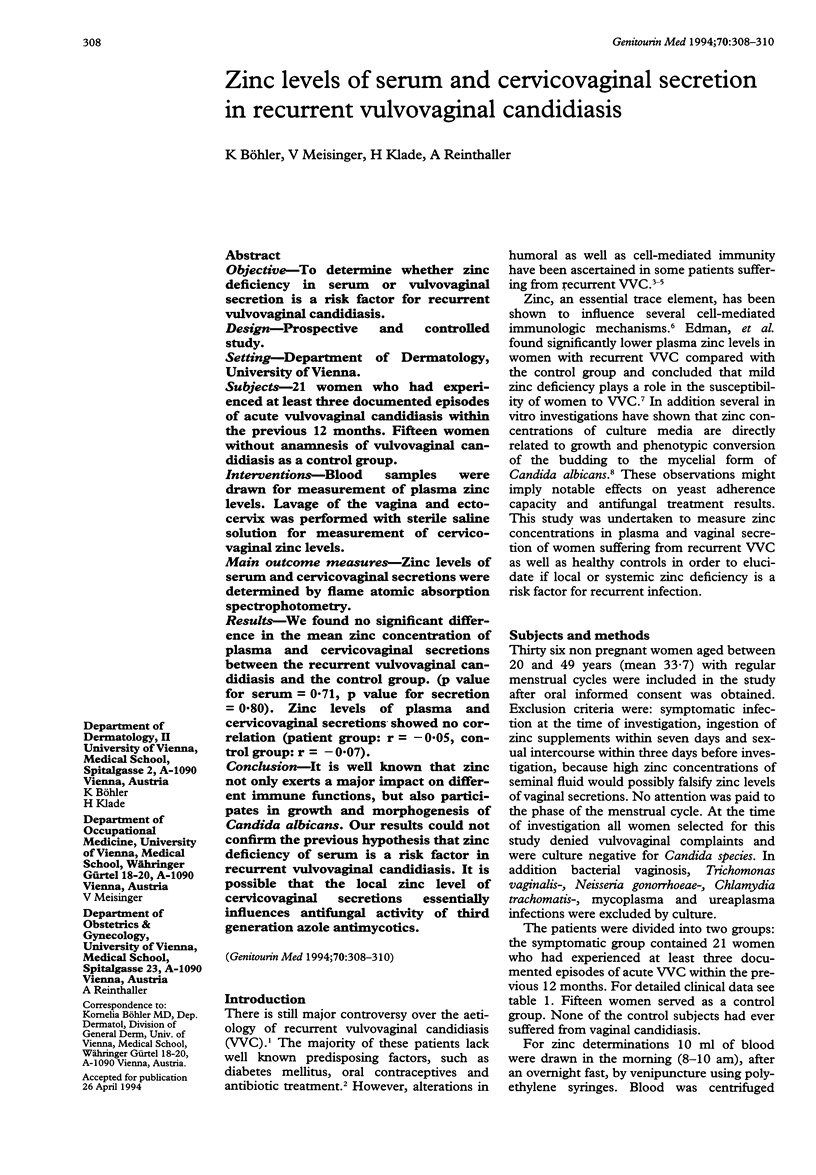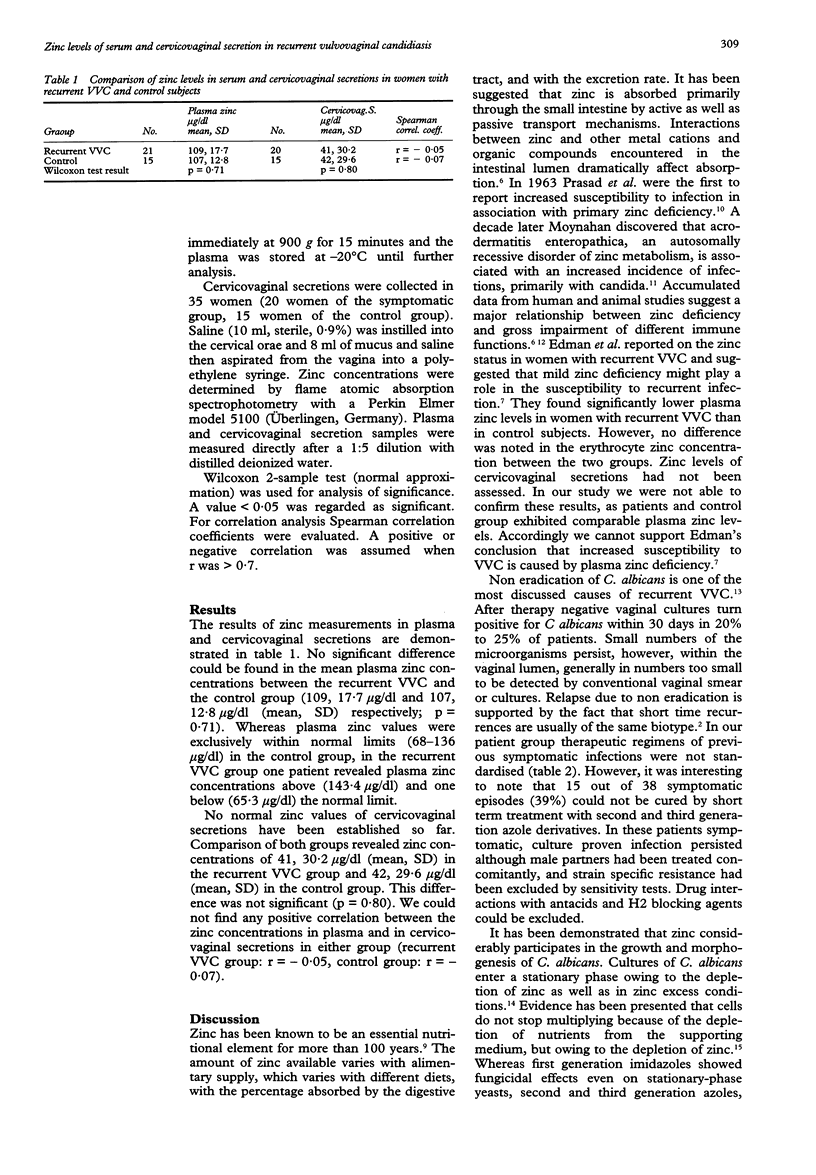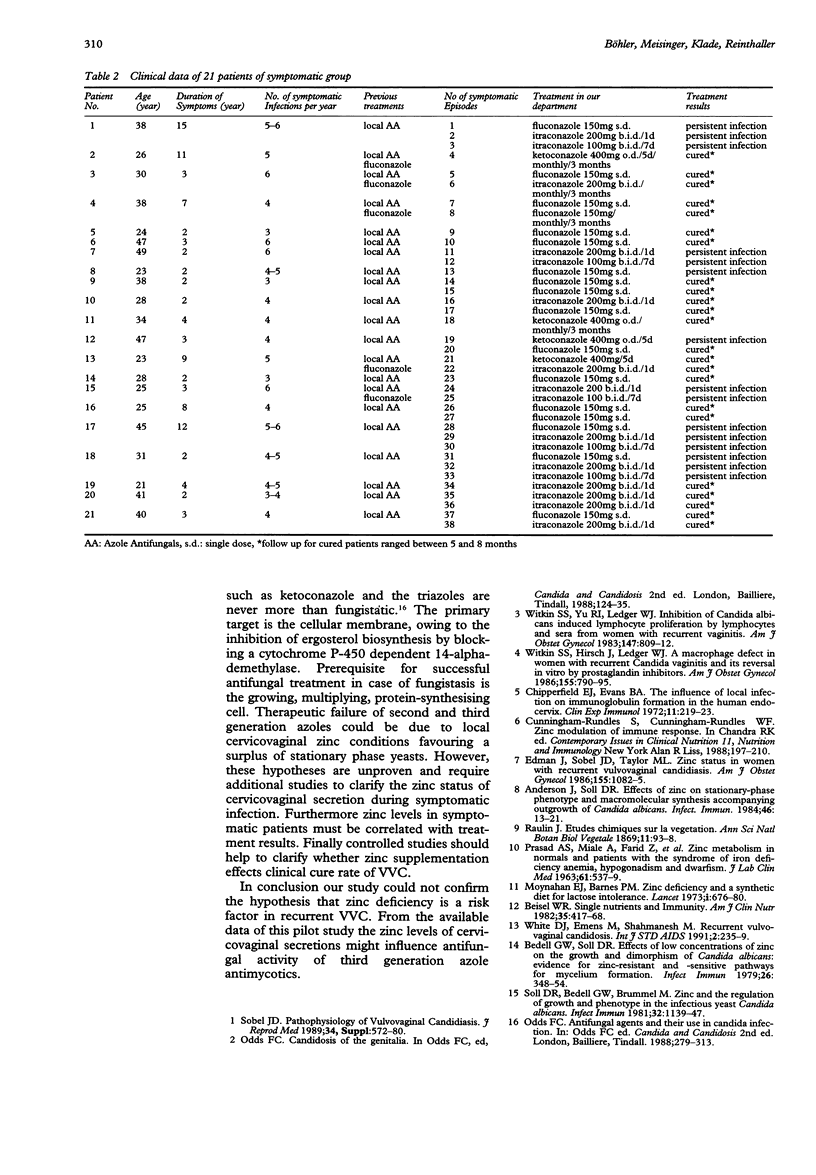Abstract
OBJECTIVE--To determine whether zinc deficiency in serum or vulvovaginal secretion is a risk factor for recurrent vulvovaginal candidiasis. DESIGN--Prospective and controlled study. SETTING--Department of Dermatology, University of Vienna. SUBJECTS--21 women who had experienced at least three documented episodes of acute vulvovaginal candidiasis within the previous 12 months. Fifteen women without anamnesis of vulvovaginal candidiasis as a control group. INTERVENTIONS--Blood samples were drawn for measurement of plasma zinc levels. Lavage of the vagina and ectocervix was performed with sterile saline solution for measurement of cervicovaginal zinc levels. MAIN OUTCOME MEASURES--Zinc levels of serum and cervicovaginal secretions were determined by flame atomic absorption spectrophotometry. RESULTS--We found no significant difference in the mean zinc concentration of plasma and cervicovaginal secretions between the recurrent vulvovaginal candidiasis and the control group. (p value for serum = 0.71, p value for secretion = 0.80). Zinc levels of plasma and cervicovaginal secretions showed no correlation (patient group: r = -0.05, control group: r = -0.07). CONCLUSION--It is well known that zinc not only exerts a major impact on different immune functions, but also participates in growth and morphogenesis of Candida albicans. Our results could not confirm the previous hypothesis that zinc deficiency of serum is a risk factor in recurrent vulvovaginal candidiasis. It is possible that the local zinc level of cervicovaginal secretions essentially influences antifungal activity of third generation azole antimycotics.
Full text
PDF


Selected References
These references are in PubMed. This may not be the complete list of references from this article.
- Anderson J. M., Soll D. R. Effects of zinc on stationary-phase phenotype and macromolecular synthesis accompanying outgrowth of Candida albicans. Infect Immun. 1984 Oct;46(1):13–21. doi: 10.1128/iai.46.1.13-21.1984. [DOI] [PMC free article] [PubMed] [Google Scholar]
- Bedell G. W., Soll D. R. Effects of low concentrations of zinc on the growth and dimorphism of Candida albicans: evidence for zinc-resistant and -sensitive pathways for mycelium formation. Infect Immun. 1979 Oct;26(1):348–354. doi: 10.1128/iai.26.1.348-354.1979. [DOI] [PMC free article] [PubMed] [Google Scholar]
- Beisel W. R. Single nutrients and immunity. Am J Clin Nutr. 1982 Feb;35(2 Suppl):417–468. doi: 10.1093/ajcn/35.2.417. [DOI] [PubMed] [Google Scholar]
- Chipperfield E. J., Evans B. A. The influence of local infection on immunoglobulin formation in the human endocervix. Clin Exp Immunol. 1972 Jun;11(2):219–233. [PMC free article] [PubMed] [Google Scholar]
- Edman J., Sobel J. D., Taylor M. L. Zinc status in women with recurrent vulvovaginal candidiasis. Am J Obstet Gynecol. 1986 Nov;155(5):1082–1085. doi: 10.1016/0002-9378(86)90355-8. [DOI] [PubMed] [Google Scholar]
- Majumdar A. S., Dutta P., Dutta D., Ghose A. C. Antibacterial and antitoxin responses in the serum and milk of cholera patients. Infect Immun. 1981 Apr;32(1):1–8. doi: 10.1128/iai.32.1.1-8.1981. [DOI] [PMC free article] [PubMed] [Google Scholar]
- Moynahan E. J., Barnes P. M. Zinc deficiency and a synthetic diet for lactose intolerance. Lancet. 1973 Mar 24;1(7804):676–677. doi: 10.1016/s0140-6736(73)92253-8. [DOI] [PubMed] [Google Scholar]
- PRASAD A. S., MIALE A., Jr, FARID Z., SANDSTEAD H. H., SCHULERT A. R. Zinc metabolism in patients with the syndrome of iron deficiency anemia, hepatosplenomegaly, dwarfism, and hypognadism. J Lab Clin Med. 1963 Apr;61:537–549. [PubMed] [Google Scholar]
- Sobel J. D. Pathophysiology of vulvovaginal candidiasis. J Reprod Med. 1989 Aug;34(8 Suppl):572–580. [PubMed] [Google Scholar]
- White D. J., Emens M., Shahmanesh M. Recurrent vulvovaginal candidosis. Int J STD AIDS. 1991 Jul-Aug;2(4):235–239. doi: 10.1177/095646249100200401. [DOI] [PubMed] [Google Scholar]
- Witkin S. S., Hirsch J., Ledger W. J. A macrophage defect in women with recurrent Candida vaginitis and its reversal in vitro by prostaglandin inhibitors. Am J Obstet Gynecol. 1986 Oct;155(4):790–795. doi: 10.1016/s0002-9378(86)80022-9. [DOI] [PubMed] [Google Scholar]
- Witkin S. S., Yu I. R., Ledger W. J. Inhibition of Candida albicans--induced lymphocyte proliferation by lymphocytes and sera from women with recurrent vaginitis. Am J Obstet Gynecol. 1983 Dec 1;147(7):809–811. doi: 10.1016/0002-9378(83)90044-3. [DOI] [PubMed] [Google Scholar]


